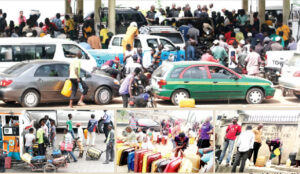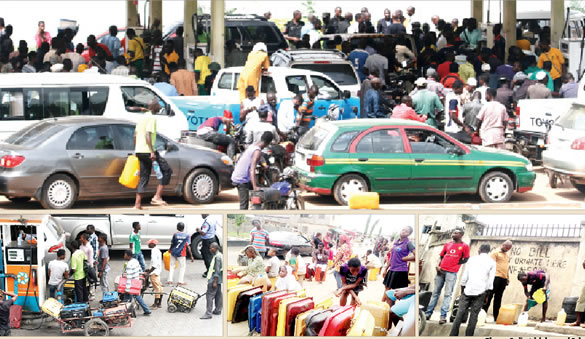The Nigeria National Petroleum Corporation has blamed the lingering fuel scarcity in the country on panic buying and sharp practices by some petroleum marketers who are exploiting the present situation to make more money.
The company also vowed that the fuel queues across the country would end next week, noting that it had enough litres of fuel to end the scarcity.
Petroleum marketers, however, disagreed with the position of the NNPC, insisting that inadequate supply was a major reason for the persisting fuel scarcity.
Recall that on Tuesday, the NNPC spokesperson, Femi Soneye, assured that the ongoing shortage in supply of petroleum products and queues for the products would be cleared by May 1.
According to him, the company had more than 1.5 billion litres of petroleum products available, enough to last for at least 30 days. He added that some individuals might be exploiting the situation to maximise profit.
The Major Energies Marketers Association of Nigeria had in a statement said its members in Apapa and other locations in Lagos had received 300 million litres of fuel from eight vessels this week.
This was after the South-West Regional Coordinator of the Nigerian Midstream and Downstream Petroleum Regulatory Authority, Ayo Cardoso, also confirmed that aside from the 240 million litres offloaded at various depots on Monday, close to 85 million litres of petrol was offloaded as of Tuesday evening.
Cardoso stated that the government was doing its best to ensure massive distribution of PMS, adding that the product would soon be available across the country.
According to him, each state of the federation had its allocations, saying the same will be delivered to reduce the queues at filling stations.
“As I said earlier, there will be enough fuel across Nigeria soon. We have received over 300 million litres as of Tuesday. More have arrived as we speak, but I can’t give you the figure. Vessels will keep arriving in Nigeria for 15 days, which started counting on Monday, and we will keep distributing the product across the nation.
“The masses should not panic; all these will soon vanish. We are not prioritising anywhere, each state has its allocation to be delivered accordingly,” Cardoso stated.
In the last few days, the queues and shortage of petroleum products worsened the living conditions of most Nigerians as they struggled to get the product.
Roads were deserted while some individuals parked their vehicles at various filling stations pending the availability of petrol.
Hoarding of the product had also been on the increase, as some took advantage of the situation.

Concerned, the House of Representatives Committee on Petroleum Resources (Downstream and Midstream) called on security agencies to pick up hoarders of PMS.
Speaking with REPORTERS, the spokesperson of NNPC, Olufemi Soneye, explained that the oil firm currently had about three billion litres of petrol, as he blamed oil marketers and panic buying for the lingering queues.
“The queues are clearing. They won’t just clear like that, because people are trying to hoard, while others are buying what they don’t need. That is why we keep saying there is enough product; there is no need to buy what you don’t need.
“Also, you can’t exclude the marketers in this, as they want to use this opportunity to make more money. These are the issues, which is why we have involved the NMDPRA, because it is their duty to ensure that the right thing is done by these filling stations.
“Our job is to provide the product and we’ve told you that we have over 1.5 billion litres available. So, the NMDPRA should please do something about the distribution. It is not our job. We are not the regulator, and we don’t have power to sanction the filling stations that are not doing what they are supposed to do.”
Soneye said the NNPC had increased the volume of petrol in Nigeria and insisted that distribution by marketers was now the concern.
Stop blaming us for scarcity – Marketers to NNPC
Marketers under the aegis of the Independent Petroleum Marketers Association of Nigeria have, however, told the NNPC not to blame them for the queues in filling stations, saying they were not involved in sharp practices.
The National Vice President of IPMAN, Hammed Fashola, wondered how the NNPC could shift the blame to marketers, who were not the importers of petrol.
Fashola said marketers could only hoard an available product, recalling how IPMAN had assisted in clearing off the queues in filling stations.
“That is far from the truth. You can only divert the product that you have. You don’t divert what you don’t have.
“On the issue of pricing, we are in a regime of partial deregulation. If you noticed, even before this crisis, we had different prices everywhere. That is another issue that cannot stand.
“On the issue of hoarding, you cannot hoard what you don’t have. It is not even making sense when you have fuel at this critical period, then you say you want to hoard it. So, that is not true too,” he said.
Asked if the marketers were now getting the product from the NNPC, the IPMAN leader said, “Let me use this opportunity to commend the NNPC, despite the fact that they want to put the blame on us. I think they’re trying their best to put the situation under control”.
Fashola added that independent marketers did not engage in sharp practices.
“We have already set up a task force within the IPMAN to make sure our people play according to the rules and regulations. We are a very disciplined organisation. We don’t do any sharp practices; we don’t condone that.
“If you remember, last week they told us it was a logistic problem, and we know what that means. So, why are they blaming marketers for the scarcity? We are not the importer, we are not in charge of shipment; we are not their clearing agent. We don’t even own our own depot. So, how can they blame us for that?” he asked.
Also responding to the NNPC’s allegations, the National Public Relations Officer of IPMAN, Chinedu Ukadike, debunked claims that the oil marketers were responsible for the persistent fuel scarcity.
Ukadike, speaking in a telephone interview on Friday night, stated that marketers established their businesses solely for profit and returns on investment, and would not create artificial scarcity, adding that the heavy capital and incurred bank charges did not allow for hoarding of the petroleum product.
He said, “We are the last in the distribution chain of supply. We break the box of NNPC, and as I am talking to you, IPMAN has over 20,000 filling stations scattered in the nooks and crannies of this country. We established our businesses to be able to maximise profit and have a return on investment.
“There is no sharp practice at all. Anytime there is inadequate supply of petroleum products, you would find out that independent marketers advertise and even go as far as washing vehicles’ tyres and windscreens and instructing our pump attendants to sell petroleum products, because we believe in turnover. The kind of money we are using to buy products, around N40m, is too huge for someone to hoard. We even incur bank charges.
“There is no way we can hoard products. Once they are given to us, we sell them as quickly as possible.
He added, “We are ready to sell for 24 hours if security is provided for us and financial support is also given to us. As an official, I can tell you that we are not involved in any sharp practice. Once petroleum gets to us, we will sell to consumers, because we interface with them and we know how it feels when product is scarce.”
The official further called on security agencies to wade off street urchins profiteering from the scarcity.
“I won’t also say that there are no people, such as street urchins, who take advantage of the situation to engage in sharp practices, using their vehicles to buy petroleum product and then distribute to jerry cans for profiteering. We are aware of those issues, and the national president of IPMAN has advised that marketers should involve security agencies to wade off all those persons standing in front of their filling stations.”
Also speaking to Saturday Thepaan, the Executive Secretary of the Major Energies Marketers Association of Nigeria, Clement Isong, said even though sharp practices existed within the oil sector, it should not be blamed majorly for the fuel scarcity in the country.
He said, “There are many reasons. I don’t doubt that some sharp practices are going on, but it is too simplistic to say that is the cause of the scarcity. So, I don’t believe that they (NNPCL) will say that.”
“I do not believe they said so. I do not doubt that there may be some sharp practices here and there, but I do not believe the NNPCL would say so.”
Explaining the cause of the scarcity, he said, “I have said it is logistic challenges. There are many other problems, but the immediate cause can be classified under logistic challenges.”
To solve the prevailing fuel scarcity, he said the government should “flood the markets with the products.”
“If you wake up and they say there is no product in Nigeria, then you can call or hold NNPC responsible. But now, the custodian of the stock is the Nigerian Midstream and Downstream Petroleum Regulatory Authority, and they have not said that we don’t have products. When Nigerians should hold us responsible is when there is no product. But, there is product in excess.
“The 1.5 billion litres we said about four days ago has increased, because we’ve added more vessels and we are going to make almost three billion litres available. So, distribution should be looked into by the NMDPRA.
“When the regulator sanctions some stations, it will make others sit up and do the right thing. But, as NNPC, we don’t have the power to sanction any station,” Soneye stated.




